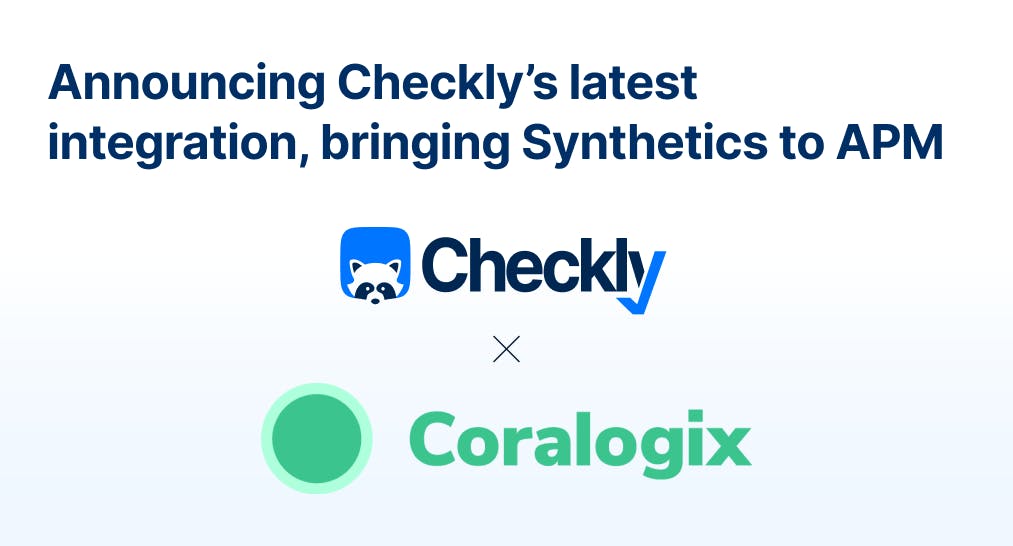Table of contents
Starting today, Checkly users can send their traces from synthetics checks to Coralogix to view in-depth synthetic user data along with back-end APM based tracing. This gives SRE’s and Operations engineers a new insight into how the system is responding to automated synthetic tests of your service.
For Checkly users, integrating with Coralogix data means it’s easy to correlate end-to-end user experience with backend performance, and track poor performance to its root cause.
For Coralogix users, Checkly harnesses the power of robust testing framework Playwright to give developers detailed test results that accurately simulate user behaviour. Checkly delivers extremely low latency between the time tests are run and the time you get an alert, and scales easily from monitoring small projects to enterprise production services. Engineers can write tests in typescript or javascript and manage all their monitoring tests in a shared repository with the Checkly CLI, enabling a seamless Monitoring as Code workflow.
"We reduced the time we spent on monitoring by 60% and became more efficient, as we now know as soon as some of our endpoints misbehave."
— Alessio Casco, Head of DevOps, TrueLayer
Sending Checkly Traces to Coralogix
Sending your trace data to Coralogix from Checkly takes just a few minutes to set up. From your Checkly interface, go to your account menu at the top right, and select ‘Integrations’. You’ll see the new options for Coralogix. Start by selecting your Coralogix region and Team Name. Note that these settings must match your Coralogix account, observable in your Coralogix account URL.
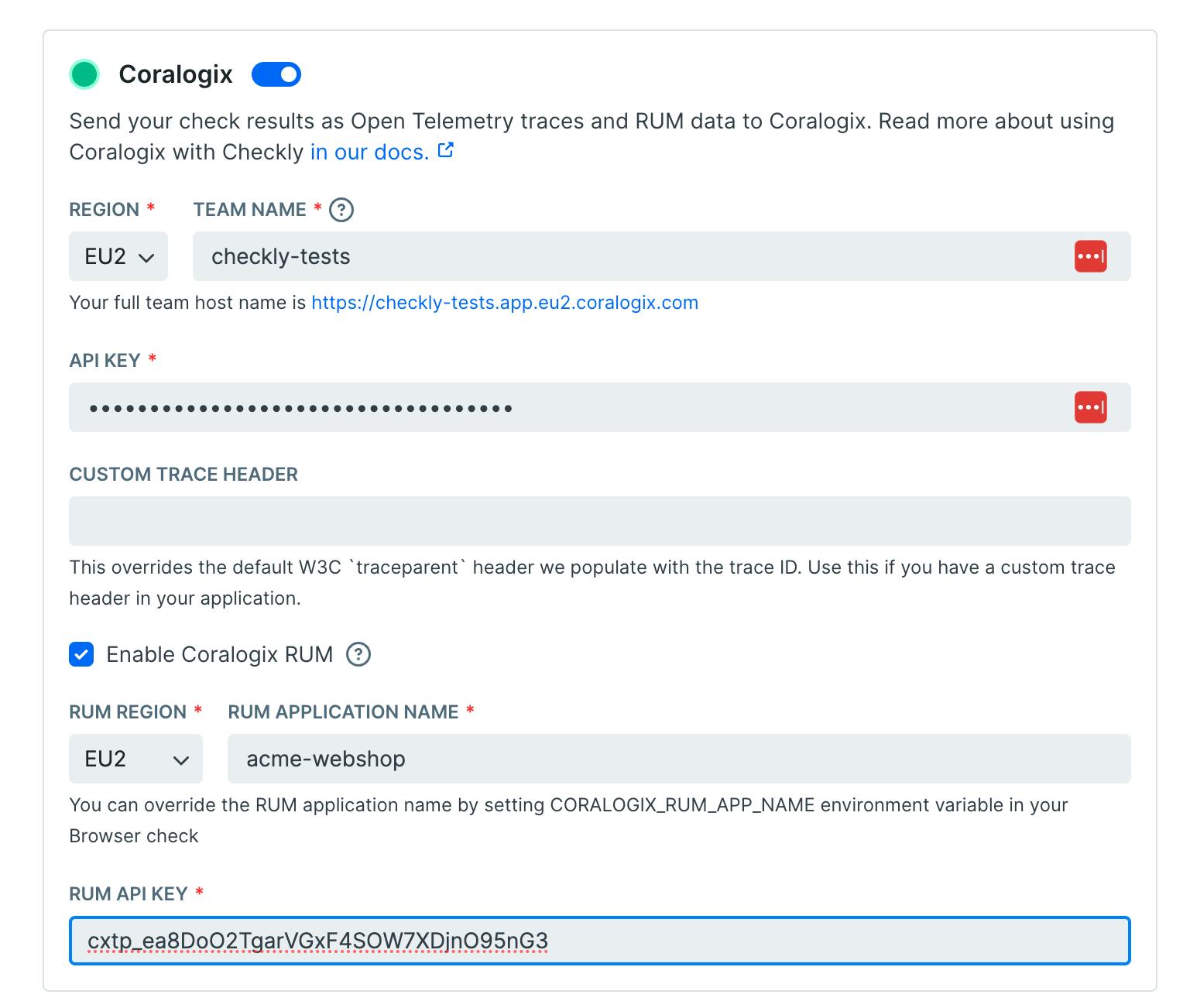
Enter your Coralogix API Key, and enter a custom trace header if you want to override the default traceparent header. Below these settings you’ll also see the Real User Monitoring (RUM) integration settings, which I’ll discuss later in this article.
Once the integration is activated, you’ll see a new option from the details view of any check: “Open in Coralogix”
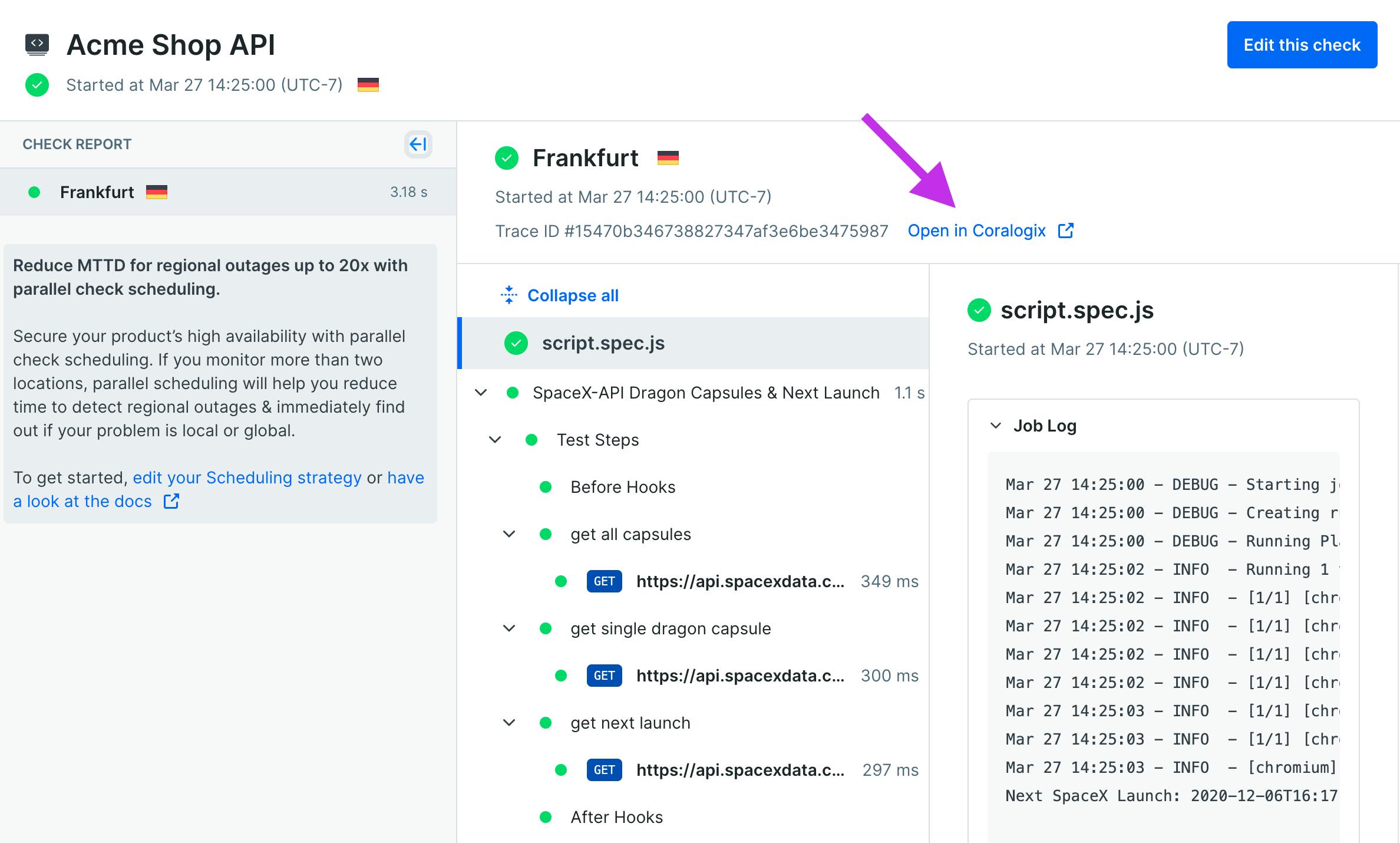
Once you’re in the Coralogix dashboard you have a chance to really see what parts of your back end service may be causing slow performance for this particular Checkly test. This is particularly useful if you suspect that something is causing synthetic tests to perform differently than real user requests, or if you’ve just got a spike in slow performance that you can’t otherwise explain.
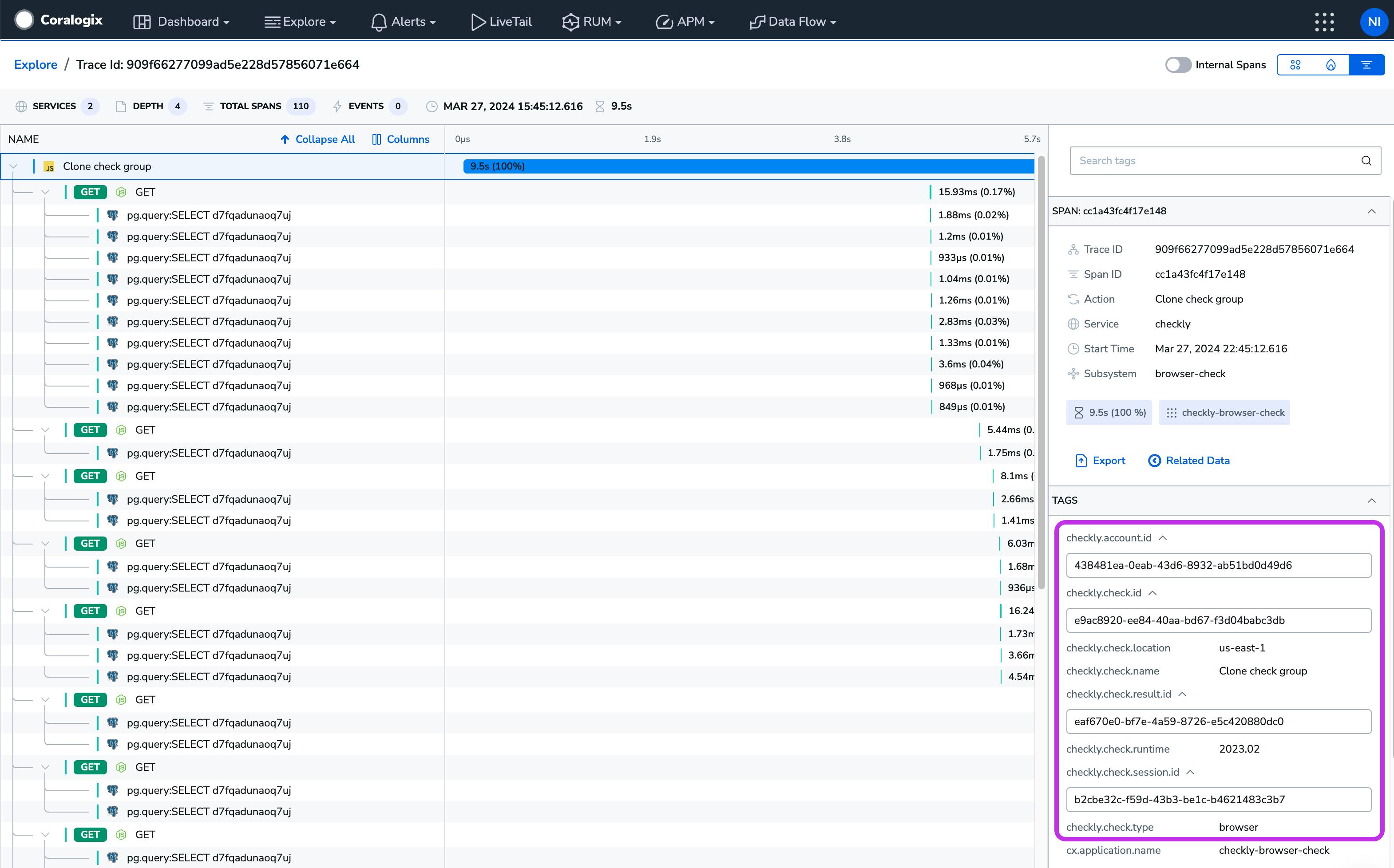
Within the Coralogix dashboard the trace view shows a number of details about trace including tags. Here you can see the Trace ID that Coralogix uses to connect the Checkly trace to the spans.
You’ll also see the check’s name here and can even find the check’s URL by appending the checkly.check.id to the url: https://app.checklyhq.com/checks/[check.id]
Coralogix RUM integration
If you’ve implemented a complex user behavior path as one of your Checkly checks, you may want to send data from those checks into Coralogix Real User Monitoring (RUM). Activate this integration in the account settings for Checkly by setting region, app name, and RUM API Key.
Note that for some, Synthetics data from tools like Checkly is a sort of antonym to Real User Monitoring, and sending Checkly data into your RUM datastore is something of a false signal.
Checkly synthetic monitoring and Coralogix session recording
Coralogix’s session recordings can be a powerful tool in combination with Checkly’s synthetic monitoring. With Checkly, you can automatically monitor pages with a set, predictable set of behaviors and compare changes in performance overtime. Coralogix session recordings let you view a record of a single user’s experience and behavior on the site.
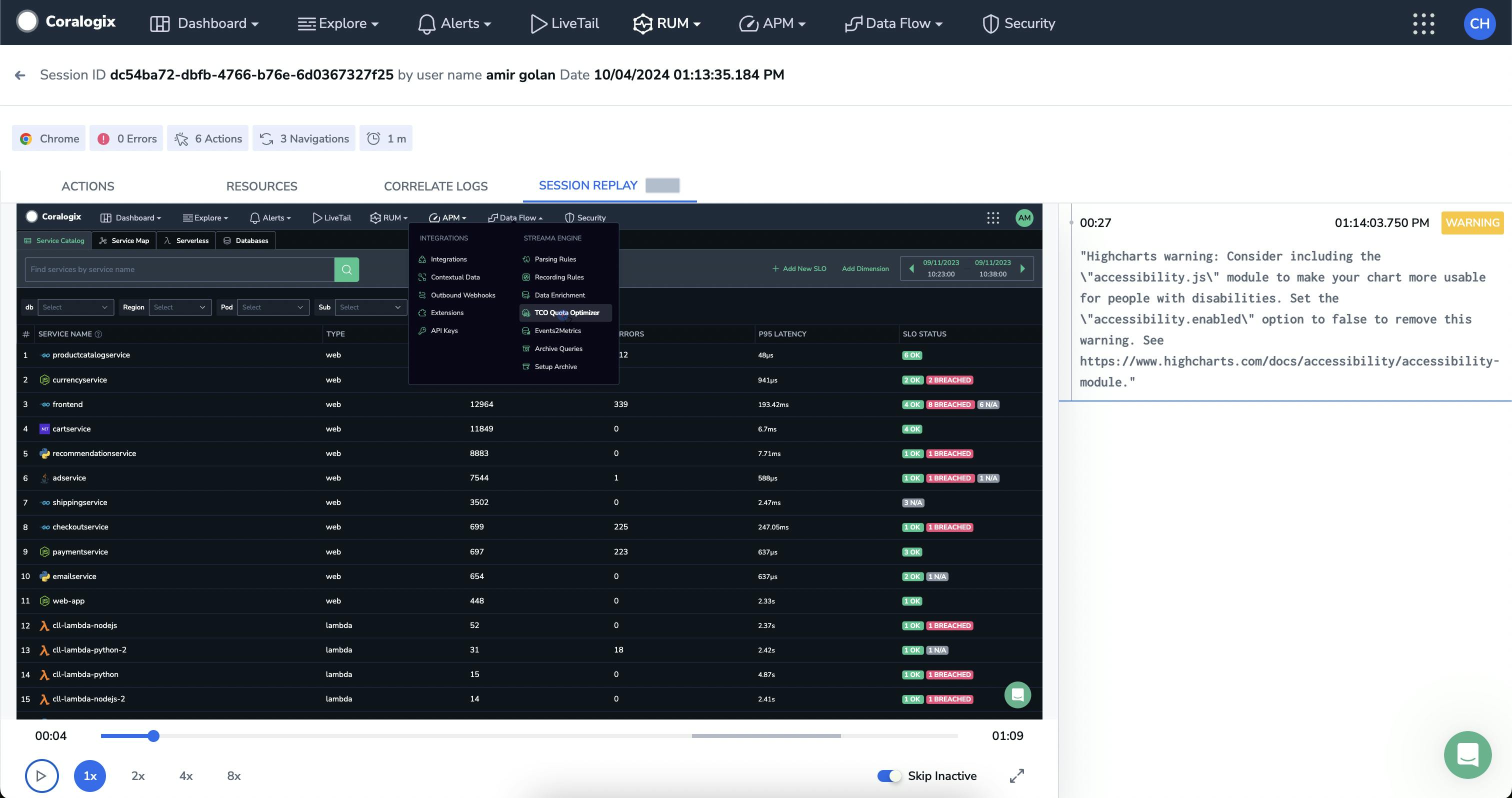
Replaying a real user’s session in the Coralogix RUM dashboard
So, while synthetics can tell you ‘this resource is slow to load most of the time,’ session recording can tell you how users are responding to that slowness, and how their specific experience is affected.
How it works behind the scenes
How did we get such detailed trace information into Coralogix? The secret is the OpenTelemetry project, and the OTLP transfer protocol.
OpenTelemetry (OTel) provides a unified way to collect detailed telemetry data for applications and services. By leveraging OTel, Checkly can capture comprehensive traces of synthetic monitoring checks, including every interaction and request made during a check's execution. These traces are then serialized using the OTLP (OpenTelemetry Protocol), a high-performance, language-agnostic protocol designed for the efficient transmission of telemetry data.
When Checkly sends trace data to Coralogix using OTLP, Coralogix's backend processes this data, enriching it with additional context and metadata. This process allows Coralogix to present a detailed, actionable view of each trace, making it easier for engineers to understand the performance and behavior of their applications under synthetic testing conditions.
Conclusions: Checkly Everywhere
Checkly is all about knowing the real performance of your sites and services. With site monitoring, API monitoring, and heartbeat checks, Checkly lets engineers implement end-to-end testing in a few minutes, and run monitors at a set cadence from multiple geographies to let you really know what your users are experiencing.
With a monitoring as code workflow you can adopt a shift-left monitoring tool that supports your modern DevOps culture and allows you to code your monitors at scale. When everyone can track versions and changes of monitors from a shared repository, it empowers more team members to work on monitoring earlier in the development lifecycle. The result is faster feedback for developers, a more reliable product, and downtime alerts that warn you far before you get the first user report. We’re all excited with the new Coralogix integration, and look forward to using OpenTelemetry in more contexts to expand who has access to Checkly data. If you’d like to learn more about Checkly’s adoption of OTel, join us for a webinar on the future of Synthetics and OpenTelemetry on May 21st.
Join the Checkly Community
We love getting to talk with SREs and Operations people about the challenges of testing productions services. Join the Checkly slack today to learn how others are using our powerful service integrations.

